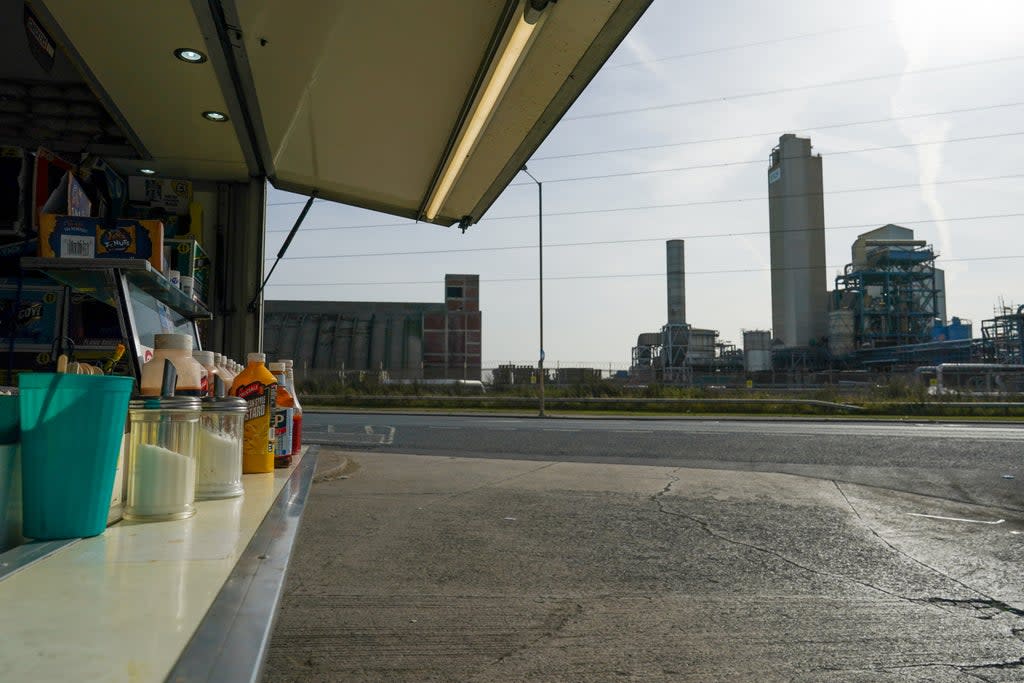Relief in Billingham: CO2 rescue welcomed in North East’s industrial heartland

In the shadow of two twin industrial towers on a sprawling industrial site just outside the Teesside town of Billingham, Dave Eden stands in his food truck cooking burgers and sausages from morning until noon.
The towers are part of CF Fertilisers. They have nothing to do with Dave. He just happens to park in a layby opposite them every day because lots of lorries pass by – “and lots of lorries means lots of hungry drivers”.
Nonetheless, it is exactly small business-owners like this 55-year-old that faced devastation this week when this giant American-owned plant was shut down.
Its American owners said they could not continue to operate due to spiralling natural gas prices.
But, because this plant – and its sister site in Cheshire – account for 60 per cent of the UK’s carbon dioxide supply, such a long-term closure threatened a major nationwide food security crisis.
That’s because CO2 is used in everything from keeping meat fresh while it is transported to putting the bubbles in beer.

For most of us, the result would have been yet mores shortages on supermarket shelves. For Dave – and hundreds of thousands more like him across the country – it would have been potentially ruinous.
“If I don’t have burgers or sausage butties to sell, that’s this place out of business,” he says. “I own two other cafes along with the truck, and if they all had the same problems – well, it’s difficult to know how we’d survive. It’s not nice to even think about it.”
The government has now stepped in, in an agreement which could cost the taxpayer “tens of millions” of pounds.
In a deal made with CS, it has effectively paid the giant company to keep producing CO2. It is, for Dave – who is from the nearby area of Norton – good news. Yet the fact it got to this stage – estimates suggest the country’s supplies would have begun dwindling within a week – is of no small concern.
“It makes you realise how these things out of your control can suddenly come along and cause real pain,” he says.
Should it have ever got to this stage? Should there be more protections in place against such global earthquakes?
“You’d like to think so,” he says.
How would he have felt about going without a pint to add to his misery? “That might have been the final blow,” he says.
His food truck, because of its location, happens to serve a handful of the roughly 300 workers at CF. None of them want to speak to The Independent on Wednesday lunch time.
“We’ve been told not to talk to press,” is as much as one says, adding the instruction was given at staff meetings.
All the same, it is thought workers have been told that all jobs are safe for now after the government stepped in.
Yet disquiet appears to remain. With ministers keen to stress this is a short term solution, a feeling is detectable that more needs to be done to help energy-reliant industries against ongoing price pressures.
“This is great news for our area, the hundreds of people who work there, and the many businesses and others from food processors to hospitals who rely on its products,” said Stockton North’s Tory MP Alex Cunningham late on Tuesday but added: “I re-emphaise the need to find a long-term solution to the pressure being felt by CF and other energy intensive industries on Teesside.”
Read More
Yorkshire Ripper refused to shield in prison before Covid death, inquest told
Remote learning ‘at best partial substitute’ for classroom, analysis finds
Woman left to give birth alone in prison cell despite calling for help, report finds
Boa constrictor discovered in Shropshire hamlet
Hundreds of vulnerable people waiting months to join relatives they depend on in UK

 Yahoo News
Yahoo News 
